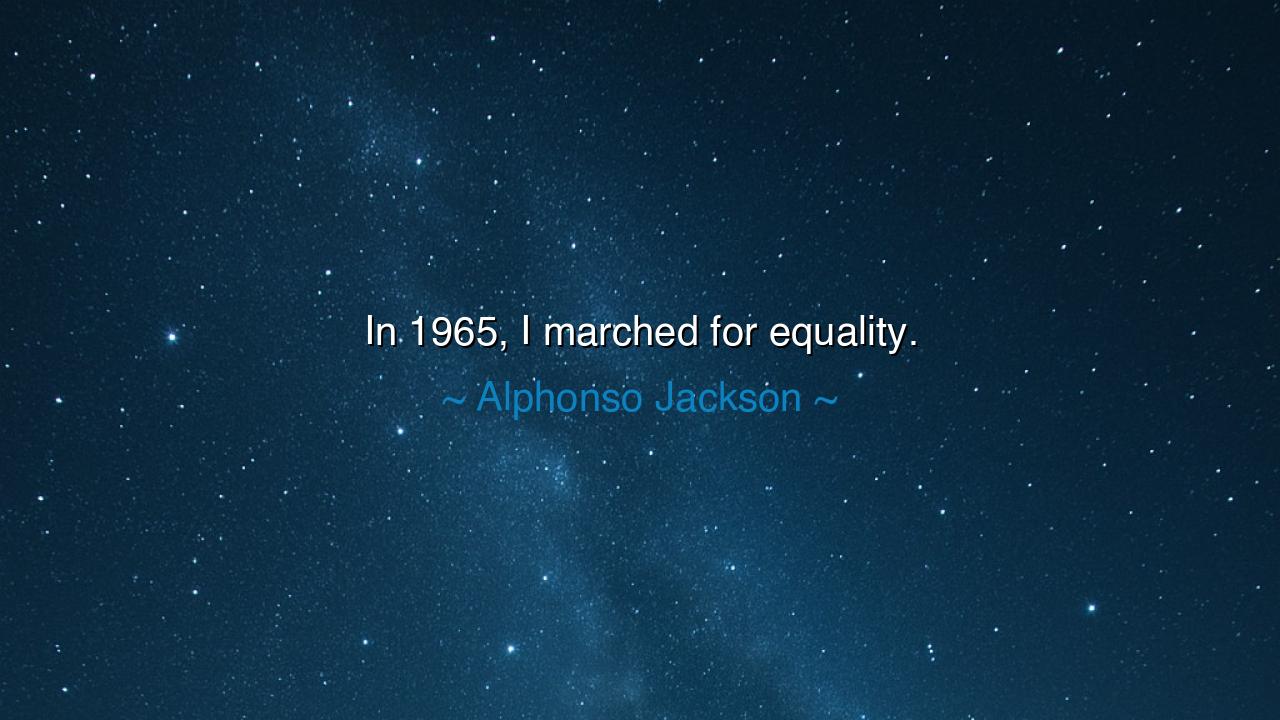
In 1965, I marched for equality.






In the simple yet thunderous words of Alphonso Jackson, we hear the echo of a generation that refused to bow to injustice: “In 1965, I marched for equality.” Though brief, this statement carries the weight of centuries. It is not merely a memory—it is a testament. It speaks of a time when faith wore shoes, when hope took to the streets, and when the courage of ordinary men and women became the fire that reshaped a nation. Jackson’s words, stripped of ornament, stand like a monument to conviction: a reminder that equality is not granted by the powerful—it is seized by the persistent.
To understand this declaration, one must first step into the soil of its origin—the turbulent year of 1965, a crucible of the American civil rights movement. That year, the nation’s conscience trembled as marchers crossed bridges and faced batons, as the oppressed lifted their heads to meet the gaze of power without flinching. It was the year of Selma, when the faithful walked from the town’s streets toward Montgomery, demanding the sacred right to vote. The marchers faced tear gas and clubs, but they did not turn back. In that moment, the very air of America burned with moral reckoning. Jackson, then a young man, walked among those brave souls, his footsteps joining the great river of human dignity flowing toward freedom.
To march for equality in that time was not a gesture of protest alone—it was an act of faith. Each step was a sermon; each bruise was a hymn. The marchers carried no weapons but their voices, and no shields but their belief that justice, though long delayed, would not be denied forever. They walked not only for themselves, but for generations unborn—for those whose names would never be known, but whose lives would be freer because others had dared to stand. This is what Jackson means when he recalls his march: he speaks of the sacred duty to confront darkness not with vengeance, but with resolve and moral light.
Consider the story of John Lewis, the young leader who led marchers across the Edmund Pettus Bridge on “Bloody Sunday.” He was beaten and left bloodied on that bridge, but his spirit remained unbroken. “We were marching to redeem the soul of America,” he later said. Alphonso Jackson’s words carry the same spirit—an understanding that the march for equality was not merely political, but spiritual. It was a demand not only for rights, but for recognition of human worth. It was a battle fought not with guns, but with endurance, and its victory was written not on paper, but on the hearts of all who watched courage rise against cruelty.
Jackson’s declaration is also a reminder that equality is not an event—it is a lifelong journey. The march of 1965 did not end with victory; it began a greater work. For every generation must march again, in its own way, against the new forms of injustice that arise—against poverty, ignorance, and prejudice reborn in subtler guises. The march continues whenever one stands for truth in the face of ridicule, or lifts a voice for the voiceless. In this way, Jackson’s words transcend history—they call each listener to take up the same spirit of action.
But there is also humility in his tone. He does not boast of triumph, but remembers a duty. “I marched for equality”—the emphasis is not on “I,” but on the cause itself. He speaks as one among many, a servant in a movement greater than any single life. His words remind us that history’s true heroes are not those who sought glory, but those who sought justice. The power of his statement lies in its quiet pride, its reverence for the collective courage of the people who refused to surrender their humanity.
So let this teaching be taken to heart, O children of freedom: the march is not over. The bridges still stretch before us—bridges of division, of inequality, of misunderstanding. If you would honor those who marched before you, then walk forward in your own time. March in your schools for knowledge; march in your cities for compassion; march in your hearts for peace. Let your life itself become a journey toward justice.
For as Alphonso Jackson reminds us, equality is not a gift to be received, but a legacy to be continued. Every generation must lace its shoes with courage and take to the road once more. And when you march—not in anger, but in hope—you will find yourself walking beside the unseen multitude of those who came before, their footsteps echoing still, whispering across the centuries: “We marched, so you could rise. Now rise, so others may walk free.”






AAdministratorAdministrator
Welcome, honored guests. Please leave a comment, we will respond soon